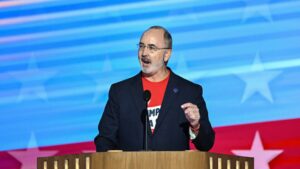UAW President Shawn Fain Joins Forces with Trump on Tariffs: A Surprising Shift in the Auto Industry
In a whirlwind of unexpected alliances, United Auto Workers (UAW) President Shawn Fain recently aligned with President Donald Trump’s agenda regarding North American tariffs, a move that has sent ripples through the automotive landscape. At the forefront of this surprising collaboration is a shared concern over the impact of free trade on American jobs, especially in the auto sector.
The Unlikely Union: Fain and Trump
Historically, Fain has been outspoken in his criticism of Trump, particularly during his presidential campaign. However, during an appearance on ABC News’ This Week, Fain voiced his support for a proposal that includes imposing a hefty 25% tariff on automobiles and auto parts, signifying a pivot in his rhetoric. “Tariffs are an attempt to stop the bleeding from the hemorrhaging of jobs in America for the last 33 years,” he stated, referencing the detrimental economic effects of the North American Free Trade Agreement (NAFTA) introduced in 1992. This stark acknowledgment of free trade’s ramifications marks a significant shift in Fain’s narrative.
Fain’s endorsement of tariffs has emerged at a crucial time when the auto industry is grappling with challenges posed by global competition and an evolving market landscape. He underscored that while tariffs are not the ultimate fix, they are a substantial step toward rectifying job losses in manufacturing.
The $1.4 Trillion Question: How Will Tariffs Shape the Market?
As tariffs on auto companies that comply with the United States-Mexico-Canada Agreement (USMCA) are paused until April, many industry insiders are weighing the broader implications of these economic policies. The delay comes in the wake of Trump’s recent discussions with automotive giants like General Motors, Ford, and Stellantis, stirring up discussions about how tariffs could reshape the industry’s future.
While some perceive tariffs as a necessary evil to safeguard American jobs, critics from within the auto industry argue that these protections may bring chaos and inflated costs. "We’re seeing a lot of cost, and a lot of chaos," remarked Jim Farley, CEO of Ford, speaking about the potential fallout from these tariff measures.
A Call for Corporate Responsibility
Fain’s recent statements also reflect a call to action for corporate America, emphasizing accountability. "If corporate America chooses to price-gouge the American consumer or attack the American worker because they don’t want to pay their fair share, corporate America bears the blame for that decision," he remarked. The UAW’s position represents a shift in labor dynamics, prioritizing American workers’ needs while also demanding fair practices from corporations.
It’s interesting to note that this newfound synergy comes as the UAW remains under federal monitorship, an oversight stemming from a corruption investigation that has tarnished its reputation. With this ongoing scrutiny, Fain’s leadership and his willingness to collaborate with an unlikely partner like Trump are crucial in steering the UAW toward a more positive public image.
The Future of American Manufacturing
As Fain aligns with Trump’s administration to negotiate an end to what he calls "the free trade disaster," the future of American manufacturing hangs in the balance. It is essential to keep an eye on this evolving dynamic, particularly as negotiations unfold. Fain’s commentary reflects an urgent need to address the issues facing American workers and could signify a turning point for labor relations in the automotive sector.
At Extreme Investor Network, we believe that these shifts in policy and perspective are pivotal moments for investors and stakeholders in the automotive industry. Understanding the nuances of labor relations, trade policies, and corporate accountability will be integral in navigating the complexities of the modern economy. As these developments unfold, we invite our readers to stay informed and engaged with our insights to better understand how these changes could impact investment strategies in the auto industry.
Conclusion
In a complex and ever-changing business landscape, partnerships can form in unexpected places. As Shawn Fain steps into a new role of collaboration, the UAW’s future could see a radical transformation—one that might redefine how labor unions navigate relations with government and corporate America alike. For ongoing updates and expert analysis, continue following us at Extreme Investor Network. Your investment journey deserves to be informed by the most current and relevant insights.

